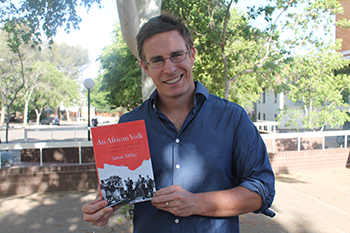Latest News Archive
Please select Category, Year, and then Month to display items
![]()
The composition of the Council of the University of the Free State is stipulated in the UFS Statute, as promulgated in the Government Gazette of 26 January 2018. The terms of office of the President of Convocation, Prof Johan Grobbelaar, Christo Dippenaar, Henry Madlala (Qwaqwa Campus) expire on 31 October 2018. Convocation has to appoint three representatives in their place, one of which has to be the President of Convocation and another should be from the Qwaqwa Campus. In terms of the Statute, both Dippenaar and Madlala are eligible for re-election.
Written nominations for the election of three representatives of the Convocation for a period of four years, are hereby requested.
The Convocation comprises of all permanent academic staff from lecturer to professor, all permanent staff other than academic staff from Deputy Director to Rector and Vice-Chancellor by virtue of their respective offices and all students (current and former) who obtained a qualification at the university.
Each nomination shall be signed by five members of Convocation and shall contain the written acceptance of the nomination by the nominee under his or her signature, as well as an abridged CV (±2pages). These must reach Dawid Kriel by 12:00 on Monday 12 November 2018. If more than one person per each of the three categories is nominated, elections will be held on or before Friday 16 November 2018. You will be notified of the final date for elections in due course. Please submit your nomination via:
• E-mail: dawid@ufs.ac.za
• Fax: 086 643 1665
• Post: Dawid Kriel University of the Free State: Institutional Advancement PO Box 339 Bloemfontein 9300
• Hand delivered at: Dawid Kriel, Room 26, 1st Floor, Wekkie Saayman Building, Bloemfontein Campus
For enquiries, please contact Claudine Taylor at TaylorCL@ufs.ac.za or +27 51 401 2097.
Click here for the nominations form.
US author launches book at UFS on African volk
2016-10-17

Dr Jamie Miller, Postdoctoral Fellow at the
University of Pittsburgh and author of
An African Volk: The Apartheid Regime
and Its Search for Survival.
Photo: Rulanzen Martin
“I realised the importance of not just accessing the policies and political approaches of the leaders of the apartheid regime, but understanding the ideas and world views that informed them. Part of the solution to this was to learn Afrikaans.”
This is according to Dr Jamie Miller, a Postdoctoral Fellow at the University of Pittsburgh, on how he went about getting inside the mind of South Africa’s apartheid regime in order to complete his book, An African Volk: The Apartheid Regime and Its Search for Survival.
The book was launched on 11 October 2016 by the Archive for Contemporary Affairs at the University of the Free State on the Bloemfontein Campus.
Volk refers to the Afrikaner nationalist movement
The book is an ambitious new international history of 1970s apartheid South Africa. It is based on newly declassified documents and oral histories, the majority in Afrikaans, which focus on the regime’s attempts to turn the new political climate to its advantage.
The term volk refers to the Afrikaner nationalist movement, also known as Afrikanerdom. The story of Afrikaner nationalism was the medium through which the regime gained power.
Four main messages from the book
Dr Miller says there are four main messages for his readers. Firstly, the apartheid regime looked to contest and hijack new ideas and norms that formed the postcolonial world, and secondly, that we need to start thinking more seriously about the Cold War in terms of domestic politics, not just geopolitics.
Thirdly, South Africa should be integrated into histories of the global South, and lastly, we should conceptualise the apartheid regime by looking at it not just as an imperial holdover, but also by looking at what was happening in the world in the time period in question.